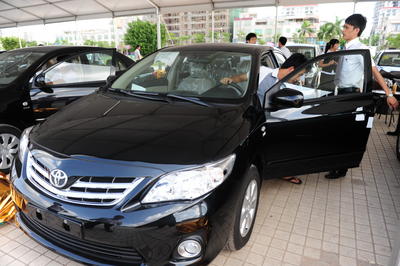This comes in reaction to the burning and destruction of some Japanese-branded cars and Japanese auto dealerships that have happened to fall in the path of Chinese demonstrators. This violence will, of course, bring short-term pain to Japan’s automakers, who will miss out on profits from China. But if history is any guide, things will eventually return to normal, and Chinese workers and automakers will suffer the greatest losses.
The most obvious way in which some individual Chinese citizens will suffer is through the temporary closure of Japanese auto assembly factories. While the factories remain closed, which could be for at least a few weeks, Chinese workers will draw no salaries. The myriad components factories that supply the automakers will also be forced to halt production, thereby idling thousands more Chinese workers.
The destruction of Japanese cars will no doubt make Chinese consumers think twice about buying Japanese cars in the near term. But Chinese consumers will eventually be compelled to consider Japanese cars once again. As Japanese automakers attempt to make up for lost sales, they are likely to lower their prices and this, in turn, will help Chinese consumers overcome their reluctance to buy Japanese cars. Chinese consumers, ever keen to take advantage of a good deal, will eventually begin to rationalise that purchasing a Japanese-branded car may not be such a great risk. After all, anti-Japanese protests do not happen all that often, and when they do, the news focuses only on the handful of Japanese cars that get torched, not on the thousands that remain safely out of harm’s way.
Those same lower prices for Japanese cars that get Chinese consumers back to the dealerships will also work against the makers of Chinese-branded cars. Chinese consumers, who still overwhelmingly believe foreign vehicles are of superior quality to Chinese brands, will find lower prices for high quality Japanese cars to be practically irresistible. This will in turn further erode the market share of Chinese-branded cars, which have already lost over 3 per cent of their market share to foreign brands in 2012.
And the losses to the Japanese from temporarily lowering the prices of their cars will be far less than one might expect. For some years now auto analysts have been aware of Japan’s tremendous advantage in China. The Toyota Camry, for instance, is now produced in Guangzhou with 80 per cent local content and 100 per cent local labour, yet its sales price is 20 to 30 per cent higher than in the US, and this gives Guangzhou-Toyota a huge profit margin. So, while Japanese automakers would certainly miss the higher profit margins they’ve been enjoying in China, it is also clear that they have plenty of room to lower prices without having to sell their cars at a loss.
Finally, it is important to recognise that foreign automakers do not operate independently in China. All of the Japanese automakers have state-owned Chinese partners that will also be missing out on sales of Japanese cars. Because most of these Sino-Japanese partnerships are 50:50, the two sides will suffer equally in terms of lost sales. But when viewed globally, the Chinese partners will suffer more than the Japanese.
The three largest Japanese automakers, Toyota, Nissan and Honda, collectively depend on China for about 15 per cent of their total global sales. Looked at another way, this means is that 85 per cent of their sales come from other markets around the world. Their Chinese state-owned partners, on the other hand, depend collectively on sales of foreign-branded cars for greater than 70 per cent of their sales of sedans in China. When Japanese cars are not being sold in China, their Chinese partners are losing most of their domestic sales; the Japanese can fall back on their other markets.
These kinds of anti-Japan protests are not unprecedented in China. Back in 2005, Chinese students and workers protested for several weekends in a row. And while it is unclear how long the current protests will last, it is reasonable to assume that once China’s government signals that it is time for the protests to end, Chinese consumers will eventually return to the Japanese department stores, sushi restaurants and auto dealerships for the quality to which they have become accustomed. On a positive note for China, its consumers will soon have an opportunity to pick up that Japanese car they’ve always wanted for a much lower price.
G.E. Anderson is owner of the consulting firm Pacific Rim Advisors and the author of Designated Drivers: How China Plans to Dominate the Global Auto Industry

